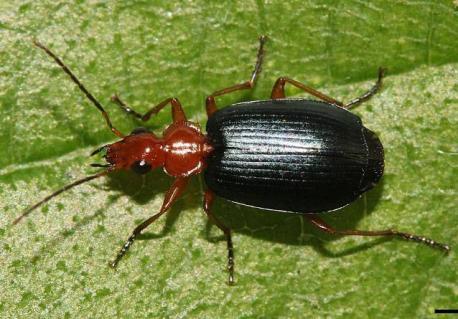Results: Pepé Le Pew & Friends
Published on 08/24/2018
QUESTIONS
GO to COMMENTS
Comments
1.
1.
Pepé Le Pew is a character from the Warner Bros. Looney Tunes and Merrie Melodies series of cartoons, first introduced in 1945. Depicted as a French striped skunk, Pepé is constantly in search of love and appreciation. However, his offensive skunk odor and his aggressive pursuit of romance typically cause other characters to run from him. Are you familiar with this character and his cartoon?

I've heard of him
17%
387 votes
I've seen the cartoon
24%
559 votes
Both
46%
1066 votes
Neither
12%
286 votes
2.
2.
Here are 10 more animals that use odor for protection. Choose the ones you've heard of or actually gotten a whiff of:

Bombardier beetle -- These ground beetles, which inhabit every continent besides Antarctica, might be the most fearsome fetid animals of them all.
13%
310 votes
Woodhoopoe -- These African birds, which occupy habitat south of the Sahara Desert, prove that birds, too, can produce stinky weaponry. Females generate a dark, foul-smelling oil from a specialized gland, which they use when their nests are under threat. This oil can be sprayed, and is not something you want staining your clothing.
4%
94 votes
Zorilla -- The zorilla, or striped polecat, might look like a skunk, but it's actually a different kind of animal entirely. A specialized member of the weasel family, this smelly carnivore has adopted the same coat coloration as the skunk to make it easier for potential predators to identify them and stay away. It lives in the dry savannas and open country of Africa. Its stinky anal emissions can also temporarily blind predators if sprayed in the eyes and can cause a painful burning sensation on the skin.
6%
127 votes
Stink bugs -- The name given to this family of insects pretty much says it all. Two glands on a stink bug's thorax are responsible for producing its smelly secretions, which deter predators from taking a bite. The animals also have a repulsive taste, so plugging your nose won't help if for some bizarre reason you're inclined to take a bite anyway.
58%
1330 votes
King ratsnake -- This serpent is also sometimes called the "stink snake" or "stinking goddess" because of the stench it is capable of emitting. Its post-anal glands are often emptied when the snake is disturbed or handled, which produces a strong, pungent odor. Like many animals with odorous weaponry, the snake uses its smell as a defense mechanism.
8%
180 votes
Turkey vulture -- Unlike many other creatures with foul-smelling secretions, turkey vultures do not have specialized glands that produce a stinky fluid. Instead, they merely have to regurgitate their last meal as self-defense. Because vultures typically consume carrion, their vomit is especially foul-smelling, with the overwhelming odor of rotting flesh. They often leave chunks of vomit around their nests to deter predators from attempting a raid.
19%
434 votes
Earwig -- These bugs got their name because of old wives' tales that tell of them burrowing into humans' brains through the ear. Luckily, those tales are false, but these creepy-crawlies do have an equally repulsive trait. Some species can squirt jets of a foul-smelling urine-colored liquid from scent glands when threatened. They are capable of squirting this fluid and using their pincers at the same time
24%
555 votes
Honey badger -- Named for their appetite for honey, these fierce carnivores have a defensive trait hardly as sweet-smelling as their favorite food. Honey badgers can turn their anal pouch inside out, which produces a musky stench that can be suffocating. Aside from deterring predators, this trait may also help honey badgers procure their prized honey by having a calming effect on bees.
16%
358 votes
Millipede -- These leggy bugs are not biters like centipedes are, but they have another form of weaponry. Many species can emit various foul-smelling liquid secretions through microscopic holes called ozopores along the sides of their bodies. These secretions can also burn the skin, so handling millipedes is not recommended, even if you can stand the stench.
21%
483 votes
Mink -- Minks are another member of the Mustelidae family (including otters, weasels, badgers, wolverines and polecats) that can produce a smelly defense. Though not as pungent as skunks, they can excrete an odorous fluid from glands when threatened. They might be cute, but they're musky too.
25%
564 votes
Not Applicable
30%
678 votes
3.
3.
Couples in long-term relationships can attest to the fact that hearing and smelling their significant other's flatulence doesn't bother them as much anymore. But as it turns out, that gassy stench can be beneficial to one's overall health. Researchers from the University of Exeter in England have discovered that certain gases from stinky farts can combat diseases. "Although hydrogen sulfide is well known as a pungent, foul-smelling gas in rotten eggs and flatulence, it is naturally produced in the body and could in fact be a healthcare hero with significant implications for future therapies for a variety of diseases," lead researcher Dr. Mark Wood was quoted as saying in the journal Medicinal Chemistry Communications, as relayed by Yahoo News. He added that a microbial byproduct within farts can lower the chances of heart attacks, strokes, dementia and cancer. Have you heard of this before and do you believe it?

Heard of this study
8%
193 votes
Believe it
12%
269 votes
Both
6%
134 votes
Neither
74%
1702 votes
4.
4.
Finally, do you believe you're a Party Pooper?
Yes
19%
444 votes
No
81%
1854 votes
COMMENTS


